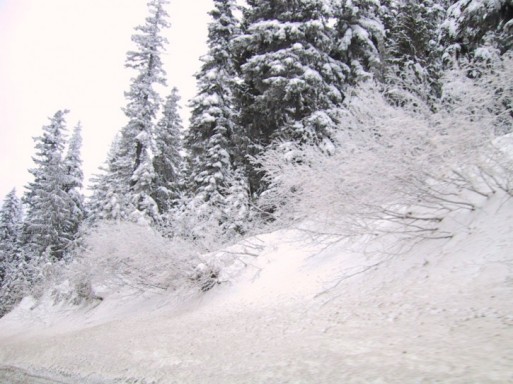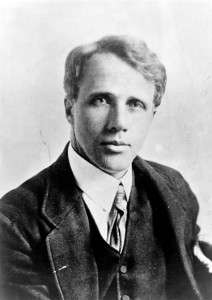The first time I read Robert Frost’s “Stopping by Woods on a Snowy Evening,” I immediately interpreted it (as many others have) as a poem about a suicidal man reluctantly resisting the tempting thought of taking his own life. Here’s the poem in its entirety:
Whose woods these are I think I know.
His house is in the village, though;
He will not see me stopping here
To watch his woods fill up with snow.My little horse must think it queer
To stop without a farmhouse near
Between the woods and frozen lake
The darkest evening of the year.He gives his harness bells a shake
To ask if there is some mistake.
The only other sound’s the sweep
Of easy wind and downy flake.The woods are lovely, dark, and deep,
But I have promises to keep,
And miles to go before I sleep,
And miles to go before I sleep.
The first stanza seems to show the lure of death; the narrator feels secure in his ability to kill himself because he is completely alone, and the property owner “will not see [him] stopping here” (3). Thus he contemplates going through with it, taking so long that the “woods fill up with snow” (4). In the second verse, the horse almost acts as a symbol of reason, of the doubt that fills the man’s mind. The horse doesn’t see the temptation; rather, he finds this behavior “queer” (5). After all, it truly is a huge risk to stop in the midst of a heavy snow “without a farmhouse near” (6), and on “the darkest evening of the year” (8).
In stanza three, the narrator continues to mull over his idea, but his subconscious plagues him still. His reservations “give[] his harness bells a shake” (9), trying to awaken the man to the reality that surrounds him. These negative thoughts can only be “some mistake” (10), in the horse’s eyes. But the narrator is completely lost in thought, which is why it’s so quiet: “The only other sound’s the sweep/Of easy wind and downy flake” (11-12). He, unlike his horse (and subconscious) still feels that this could be the opportunity he’s been looking for.
The final passage of the poem offers relief, however. Despite the appeal of the suicide the man has been considering (the “woods” [13]), the narrator comes to realize that he cannot give up so soon. Not only does he have a long way to go in life, but he also has “promises to keep” (14), likely a family and friends that love him, on top of any other lesser duties, like work. And therefore, the man decides against committing suicide, and begins his long trek home.
Though there is a “happy” ending to this dismal interpretation, there is another way entirely to read this poem. It could represent just the opposite: a desire to try and prolong life, in order to delay one’s death. Perhaps this scene of a man stopping to enjoy a beautiful view signifies our natural aversion to death. No one wants to race toward it; we’d rather slow things down and savor the time we have. And perhaps the antsy horse is a symbol for life itself, for time. No matter how much we long to cherish the precious moments we have, the clock must continue ticking. We all “have promises to keep” (14) to death. It is universal, and it can’t be avoided. Therefore, we can’t waste our time stalling. We have to continue on our way in order to achieve the many other things life has to offer, the “miles to go” (15), before we die.
Related Reading:
- More about the poem
- An interview with Robert Frost

 “Stopping by Woods on a Snowy Evening” by Robert Frost
“Stopping by Woods on a Snowy Evening” by Robert Frost




 Funeral Home Owner Chris Johnson Spending Halloween in Jail
Funeral Home Owner Chris Johnson Spending Halloween in Jail
 Our Monthly Tip: Toast a Loved One with a Personalized Glass
Our Monthly Tip: Toast a Loved One with a Personalized Glass
 My Cousin’s Death Taught Me the Meaning of Life
My Cousin’s Death Taught Me the Meaning of Life














